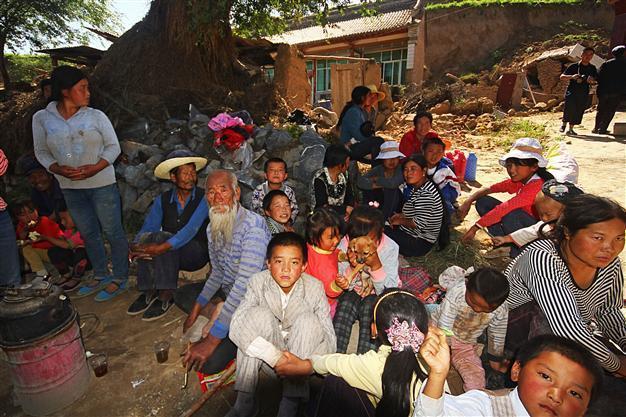Rescuers battle to find China quake survivors
MEICHUAN, China - Agence France-Presse

This picture taken on July 22, 2013 shows local residents sitting together under temporary shelter in the earthquake-hit township of Majiagou in Minxian county in Dingxi, in northwest China's Gansu province. AFP Photo
Rescuers battled through dusty rubble Tuesday to try to reach victims of two shallow earthquakes in China that killed at least 92 people, as traumatised survivors struggled with the devastation left behind.
State broadcaster CCTV showed images of soldiers digging through earth and sand to reach simple houses buried under landslides in the northwestern province of Gansu.
Seriously injured patients wrapped in blankets were put into helicopters heading to the provincial capital Lanzhou, which has the nearest major hospital.
The twin earthquakes that struck on Monday morning had magnitudes of 5.9 and 5.6 according to the US Geological Survey, but were only 10 kilometres (six miles) deep, so that much of the energy released was transmitted to the surface, where it wreaked havoc.
The city government of Dingxi, which includes the worst-affected counties, said on its verified social media account that 92 people had been killed, with hundreds more injured.
In Meichuan, where officials said 61 people had been confirmed dead, Bo Yonghu, 25, stared solemnly at the remains of her family's mud and stone home.
The back wall had been caved in by boulders crashing down the hillside behind.
"I thought it was going to be completely swallowed by the mountain," she told AFP. "I will not be entering the house again. Not ever." She, her parents, brother and sister had one bed to sleep on in their courtyard, under plastic sheeting nailed to four poles.
Neighbour Yang Su Xiao, 18, the only family member at home when the earthquake struck, immediately ran outside and turned to see her bedroom reduced to rubble.
"I know I had a lucky escape," she said. "I am glad we are all not injured, but we don't know how we are going to repair the damage." Elsewhere in the township, the China Daily said one family had lost three children. "How can I live on after two of my grandsons and one granddaughter passed away?" it quoted Zhu Xueqiao as saying.
"Four of my family's five houses were brought down in last year's mudslide, and now the quake has killed my grandchildren. I almost want to go with them," she said.
Roads in the area were peppered with large boulders fallen from the surrounding mountains, and relief workers used shovels to clear a large landslide.
Initial investigations showed at least 5,785 houses had collapsed and another 73,000 were severely damaged, China's official Xinhua news agency said.
Around 6,000 rescuers, among them armed police, firefighters, militiamen and local government staff had been sent to the region, it added.
Hundreds of aftershocks were recorded in the disaster zone, an area of dusty, jagged mountains.
CCTV showed makeshift tent relief centres being set up, with water, instant noodles and blankets being handed out.
Throughout the night, scores of rescue vehicles headed south from Lanzhou to the quake area.
Many rescue workers had travelled from across the country and refused to rest during the night as they raced to find survivors.
"We know the road is more dangerous when it is dark, but we cannot waste a second," said a relief worker who had flown from Beijing with 12 volunteers.
His group joined convoys of army vehicles and ambulances on the highway to Min county, which includes Meichuan.
Any storms could hamper the rescue efforts, bringing with them the threat of further landslides.
Beijing's own China Earthquake Networks Centre put the magnitude of the larger quake at 6.6.
The China Earthquake Administration said the same fault zone was linked to a magnitude 8.0 quake on July 21, 1654, Xinhua reported.
The USGS rated Monday's main tremor at seven on its "shakemap", with shaking perceived to be "very strong".
Much of western China is prone to earthquakes. Around 230,000 people were killed in a magnitude 8.5 tremor in Gansu in 1920. A magnitude 6.6 earthquake in neighbouring Sichuan province killed about 200 people earlier this year, five years after almost 90,000 people were killed by a huge tremor in the same province.
